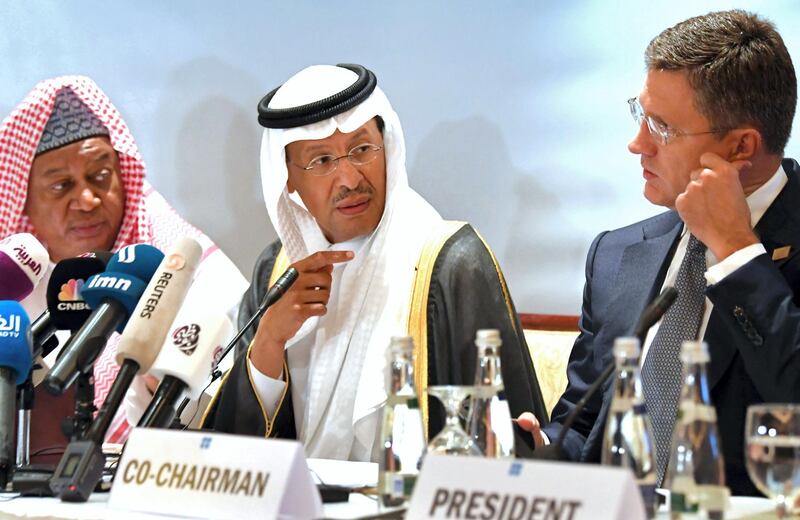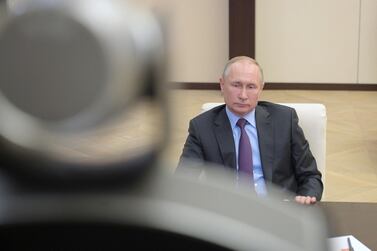Oil markets would require stronger output curbs than the caps suggested in February should the Opec+ alliance agree new cuts to counter the rout in markets driven by the coronavirus pandemic.
Oil prices recovered by about 30 per cent after US President Donald Trump suggested that Riyadh and Moscow are likely to work together towards cutting output.
Brent, the most widely used benchmark for global crude, jumped almost 14 per cent on Friday to finish the week at $34.11 per barrel.
WTI, which fell below $20 (Dh73.46) per barrel in late March, also rallied strongly, closing about 12 per cent higher at $28.34 per barrel.
Mr Trump met oil industry executives on Friday, pledging to "get our energy industry back".
Saudi Arabia had planned to bring 12.3 million barrels per day of supply to the markets this month following the collapse of talks between producers of the Opec+ alliance. The move came amid a record slump in demand as countries shut borders and airlines grounded fleets as governments enforced social distancing and quarantine measures to contain the outbreak.
"When Opec+ met in February 2020, they argued about cutting 3m bpd and they failed, sparking a disastrous price war. If they agree to cooperate again, it is clear they can no longer talk about 3m bpd," Fereidun Fesharaki, founder and chairman of Facts Global Energy, said in a note.
"The demand destruction has stolen the show from Opec," he added.
The London-based consultancy estimates demand reduction of 17m bpd in April, with 12m bpd anticipated for May.
Meanwhile, commodities pricing firm Argus estimates that production cuts of 10m bpd, spread over the second quarter of 2020, and scaled back cuts of 5m bpd in the third quarter would be needed to prevent global storage capacity becoming overrun with supply.
"Indeed, if global oil demand, as expected, stages a recovery from [the third quarter] onward, then much of the supply overhang built up during first-half [of] 2020 could be drained by the early months of 2021," said David Fyfe, chief economist at Argus.
On Saturday, Saudi Arabia dismissed remarks attributed to Russian President Vladimir Putin that the kingdom was responsible for the collapse of the Opec+ deal, and said the alliance had tried to agree on further oil production cuts but Moscow refused.
Foreign minister Prince Faisal bin Farhan Al Saud said the suggestion that the kingdom had walked away from the three-year pact to shore up prices was "fully devoid of truth", the official Saudi Press Agency reported.
Riyadh said Moscow had refused to deepen cuts by 1.5m bpd in addition to a pact to draw back 1.7m bpd of inventory during the first quarter.
Prince Faisal said there was consensus on the need for additional restrictions within the alliance, which was forged in Algiers in 2016, with the exception of Russia.
Saudi Arabia also denied any suggestion that the subsequent fall in oil prices had been engineered to hurt the US energy sector, and said shale "is known as an important part of energy sources".
US shale producers, who have a relatively higher break-even cost, have suffered as oil prices fell 70 per cent from their most recent peak in January.
A significant US shale producer, Whiting Petroleum, filed for bankruptcy protection on Wednesday.
Mr Putin said on Friday that he was ready to co-operate with the US and Saudi Arabia to bring back stability to markets that have witnessed both a significant supply increase and a steep decline in demand.
Global oil demand is at its weakest amid a record surge in supply.
"We are ready for co-operation with the United States of America on this issue," Mr Putin said.
"I believe that it is necessary to combine efforts in order to balance the market and reduce production," he said.








